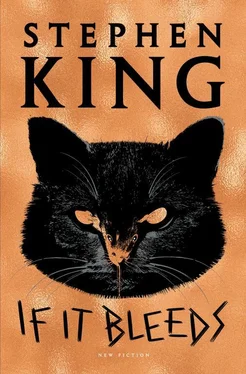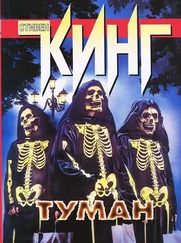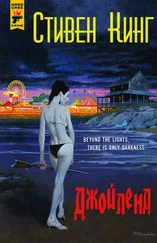“I know,” Dan Bell says.
11
Only most people would say it wasn’t, and Holly knows this.
They’d say Oh yes, there’s a resemblance, just as there’s a resemblance between Mr. Bell and his grandson, or between John Lennon and his son Julian, or between me and Aunt Elizabeth . They’d say I bet it’s Chet Ondowsky’s grandfather. Gosh, the apple sure doesn’t fall far from the tree, does it?
But Holly, like the old man in the wheelchair, knows.
The man holding the old-fashioned WLPT microphone is fuller in the face than Ondowsky, and the lines on that face suggest he’s ten, maybe even twenty years older. His crewcut is salt-and-pepper, and it comes to a slight widow’s peak that Ondowsky doesn’t have. He has the beginning of jowls, and Ondowsky doesn’t have those, either.
Behind him, some firefighters scurry about in the sooty snow, picking up packages and luggage, while others turn hoses on the remains of the United plane and two burning brownstones behind it. Just pulling away is a big old Cadillac of an ambulance with its lights flashing.
“This is Paul Freeman, reporting from the Brooklyn site of the worst air crash in American history,” the reporter says, puffing out white vapor with every word. “All were killed onboard this United Airlines jet except for one boy.” He points to the departing ambulance. “The boy, as yet unidentified, is in that ambulance. He is—” The reporter calling himself Paul Freeman pauses dramatically. “—The Boy Who Fell from the Sky! He was thrown from the rear section of the plane, still on fire, and landed in a snowbank. Horrified bystanders rolled him in the snow and put out the flames, but I saw him loaded into the ambulance, and I can tell you that his injuries looked severe. His clothes were almost entirely burned off, or melted into his skin.”
“Stop it there,” the old man commands. His grandson does so. Dan turns to Holly. His blue eyes are faded but still fierce. “Do you see it, Holly? Do you hear it? I’m sure to the viewing audience he just looked and sounded horrified, doing his job under difficult conditions, but—”
“He’s not horrified,” Holly said. She’s thinking of Ondowsky’s first report from the Macready School bombing. Now she sees that with clearer eyes. “He’s excited .”
“Yes,” Dan says, and nods. “Yes indeed. You understand. Good.”
“Thank God someone else does,” Brad says.
“The boy’s name was Stephen Baltz,” Dan says, “and this Paul Freeman saw the burned boy, perhaps heard his screams of pain—because witnesses said the boy was conscious, at least to begin with. And do you know what I think? What I have come to believe? That he was feeding .”
“Of course he was,” Holly says. Her lips feel numb. “On the boy’s pain and on the horror of the bystanders. On the death .”
“Yes. Get ready for the next one, Brad.” Dan sits back in his chair, looking tired. Holly doesn’t care. She needs to know the rest. She needs to know everything. The old fever is on her.
“When did you go looking for this? How did you find out?”
“I first saw the clip you just watched the evening of the crash, on The Huntley-Brinkley Report .” He sees her puzzlement and smiles a little. “You’re too young to remember Chet Huntley and David Brinkley. It’s now called NBC Nightly News .”
Brad says, “If an indie station arrived at some big news event first, and got good footage, they’d sell the report to one of the networks. That’s what must have happened with this, and how Grampa got to see it.”
“Freeman got there first,” Holly muses. “Are you saying… do you think Freeman caused those planes to crash?”
Dan Bell shakes his head so emphatically that the cobwebby remains of his hair fly. “No, just struck lucky. Or played the odds. Because there are always tragedies in big cities, aren’t there? Chances for a thing like him to feed. And who knows, a creature like him may be attuned to the approach of major disasters. Maybe he’s like a mosquito—they can smell blood from miles away, you know. How can we know, when we don’t even know what he is? Run the next one, Brad.”
Brad starts the clip, and the man who comes on the big screen is once more Ondowsky… but he’s different. Thinner. Younger than “Paul Freeman,” and younger than the version of Ondowsky doing his report near the blown-out side of the Macready School. But it’s him . The face is different, the face is the same. The microphone he’s holding has the letters KTVT attached to it. Three women are standing with him. One of them is wearing a Kennedy political button. Another has a placard, crumpled and somehow forlorn, that reads ALL THE WAY WITH JFK IN ’64!
“This is Dave Van Pelt, reporting from Dealey Plaza, across from the Texas School Book Depository, where—”
“Freeze it,” Dan says, and Brad does. Dan turns to Holly. “It’s him again, right?”
“Yes,” Holly says. “I’m not sure anyone else would see it, I’m not sure how you saw it so long after the plane crash report, but it is. My father once told me something about cars. He said the companies—Ford, Chevrolet, Chrysler—offer lots of different models, and they change them from year to year, but they’re all from the same template. He… Ondowsky…” But words fail her and she can only point to the black-and-white image on the screen. Her hand is trembling.
“Yes,” Dan says softly. “Very well put. He’s different models, but from the same template. Except there are at least two templates, maybe more.”
“What do you mean?”
“I’ll get to that.” His voice is rustier than ever, and he drinks some more tea to lubricate it. “I only saw this report by chance, because I was a Huntley-Brinkley man when it came to the evening news. But after Kennedy was shot, everyone turned over to Walter Cronkite, including me. Because CBS had the best coverage. Kennedy was shot on a Friday. This report was on the CBS Evening News the following day, the Saturday. What news people call a backgrounder. Go ahead, Brad. But take it from the top.”
The young reporter in the horrible plaid sport coat begins again. “This is Dave Van Pelt, reporting from Dealey Plaza, across from the Texas School Book Depository, where John F. Kennedy, the thirty-fifth President of the United States, was fatally shot yesterday. I’m here with Greta Dyson, Monica Kellogg, and Juanita Alvarez, Kennedy supporters who were right here where I’m standing when the shots were fired. Ladies, can you tell me what you saw? Miss Dyson?”
“Shots… blood… there was blood from the back of his poor head …” Greta Dyson is weeping so hard she can barely be understood, which Holly supposes is sort of the point. Viewers at home are probably weeping right along with her, thinking that her grief stands for theirs. And for the grief of a nation. Only the reporter…
“He’s eating it up,” she says. “Just pretending to be concerned, and not doing a very good job of it, at that.”
“Absolutely,” Dan says. “Once you look at it the right way, it’s impossible to miss. And look at the other two ladies. They’re crying, too. Hell, a lot of people were crying that Saturday. And in the weeks that followed. You’re right. He’s eating it up.”
“And you think he knew it was going to happen? Like a mosquito smelling blood?”
“I don’t know,” Dan says. “I just don’t know.”
“We do know he only started working at KTVT that summer,” Brad says. “I wasn’t able to find out much about him, but that much I did get. From a history of the station on the Internet. And he was gone by the spring of 1964.”
Читать дальше








